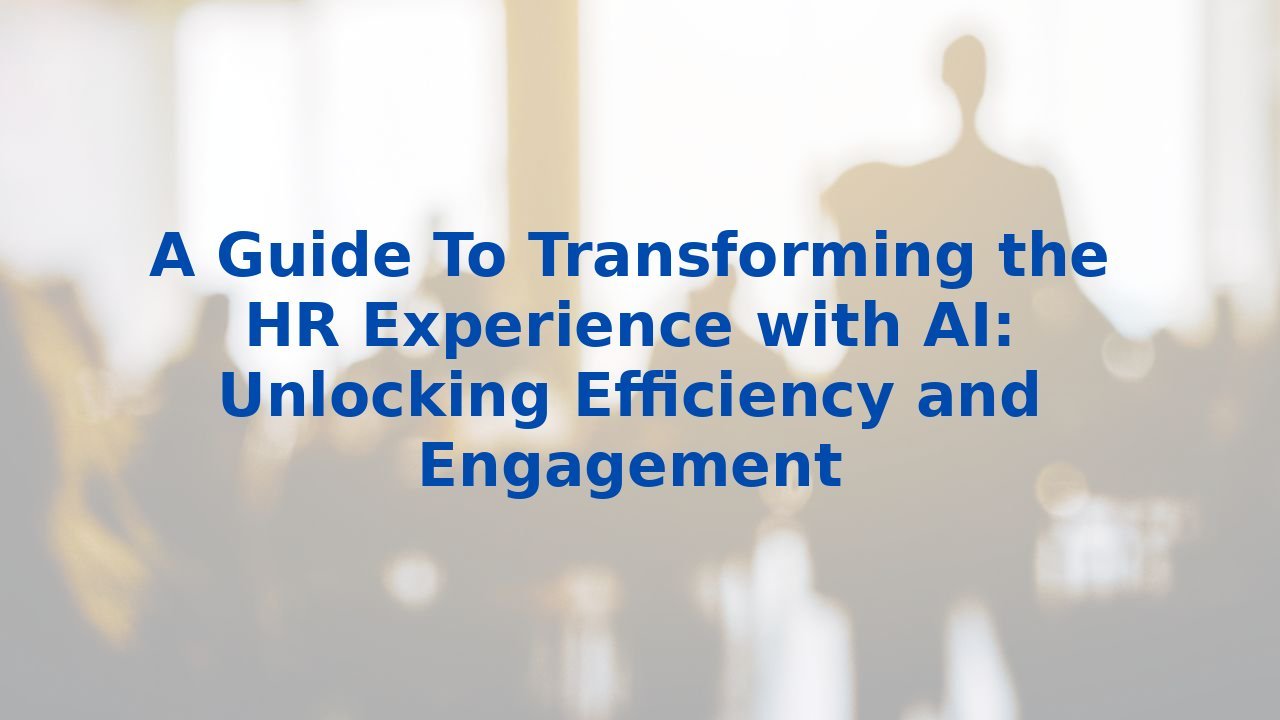A Guide To Transforming the HR Experience with AI: Unlocking Efficiency and Engagement
A Guide To Transforming the HR Experience with AI: Unlocking Efficiency and Engagement
Introduction
The Human Resources (HR) department is often viewed as the backbone of any organization, dedicated to managing talent, ensuring compliance, and fostering an inclusive and positive workplace. However, traditional HR processes are frequently bogged down by manual tasks and inefficiencies, pushing organizations toward the need for transformation. Enter Artificial Intelligence (AI)—a revolutionary force poised to reimagine the HR landscape. With its capability to automate routine functions, AI can enhance efficiency, accuracy, and employee engagement—all essential for a thriving workplace.
AI in HR: Enhancing Efficiency
AI is a game-changer for HR processes, offering a suite of tools designed to automate tasks that typically consume valuable time and resources. Here’s a look at how AI is reshaping critical HR functions:
1. Recruitment and Hiring
One of the most labor-intensive areas in HR—recruitment—stands to benefit immensely from AI. By utilizing AI-driven tools to sift through resumes and evaluate candidates, organizations can make quicker, more objective selections. AI analyzes previous hiring patterns and identifies candidates whose qualifications align closely with the organizational needs, thereby speeding up the hiring process and improving the quality of selected candidates.
2. Employee Onboarding
Onboarding is a critical moment for new hires, and AI enhances this experience by providing tailored onboarding programs. AI systems can curate personalized welcome packages, schedule training, and facilitate connection between new hires and existing employees. This creates a more engaging onboarding experience, helping newcomers acclimate more swiftly to their roles.
3. Performance Management
Performance evaluation can often feel subjective and fraught with bias. AI provides a data-driven approach by analyzing performance metrics and employee feedback. This allows organizations to formulate performance reviews grounded in analytics, identifying strengths and opportunities for growth and creating a more transparent and equitable system.
4. Employee Engagement
Understanding employee sentiment is pivotal for enhancing engagement. AI tools can assess data from various touchpoints, including emails and internal communications, to gauge employee morale. Insights gleaned from this analysis empower HR to pinpoint areas needing attention and to develop targeted strategies for improving employee satisfaction.
Benefits of AI in HR
The integration of AI into HR processes offers a multitude of advantages:
1. Increased Efficiency
By automating monotonous tasks, AI liberates HR professionals to allocate their time toward strategic initiatives that foster business growth.
2. Improved Accuracy
With AI, the margin for human error shrinks significantly, ensuring that HR operations are executed with a higher level of precision.
3. Enhanced Employee Experience
AI creates personalized experiences for employees, fostering a greater sense of value and support within the organization.
4. Better Decision-Making
The data analytics capabilities of AI furnish HR teams with insights that lead to more informed, strategic decisions, thus driving organizational effectiveness.
Training Employees for AI
While the technology itself is transformative, its effectiveness is magnified when employees are well-equipped to leverage it. Training in AI is not merely beneficial; it's essential. Here’s why:
1. Improved Collaboration
Employees versed in AI can maximize the potential of these tools, facilitating productive collaboration between technology and human insight.
2. Enhanced Skills
AI training empowers employees with in-demand skills that are increasingly valued in today’s job market, ultimately enhancing their career trajectory.
3. Better Adaptation
An understanding of AI prepares employees to embrace technological changes, allowing organizations to remain agile and adaptable amidst evolving landscapes.
Conclusion
AI is ushering in a new era for HR, opening the door to streamlined processes, data-driven decisions, and a fundamentally improved employee experience. By integrating AI into HR operations and investing in employee training, organizations position themselves not only to enhance efficiency but also to create an engaged, empowered workforce. As we delve deeper into the possibilities AI presents, the journey toward a more effective HR experience is just beginning.
For organizations eager to equip their workforce with essential AI skills, consider exploring comprehensive training solutions that not only enhance individual capabilities but also align with business goals. Transforming your HR experience is not just an aspiration; it’s an achievable reality.



